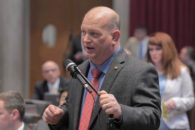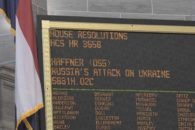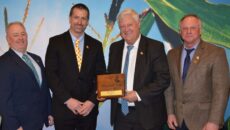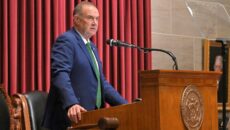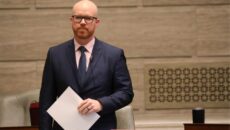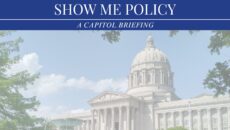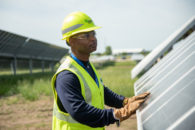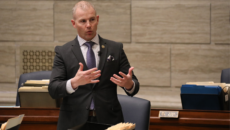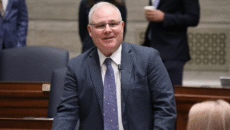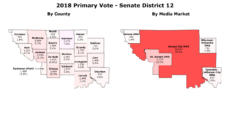A new Illinois law could bring the Grain Belt Express project one step closer to construction, according to parent company Invenergy.
Illinois Gov. J.B. Pritzker signed off on a decarbonization and energy regulation bill last week aiming to bring the state’s energy sector to 50 percent renewable by 2040 and carbon-free by 2050. Part of the bill will allow Invenergy to invoke eminent domain for its project and reapply for regulatory approval in the state.
The project was granted a certificate of public convenience and necessity by the Illinois Commerce Commission in 2016, but the order was reversed two years later when an appellate court concluded the commission had erred in approving a non-public utility.
The new bill allows “qualifying direct current projects” delivering clean energy across the state to apply for the same certificate through the end of 2023, a designation Invenergy said the project falls into.
“Meeting America’s changing demand for energy and enhancing grid stability will require additional ways of delivering energy, including through new electric transmission,” Invenergy said in a statement. “This forward-thinking legislation rightly includes support for proactive planning to meet those needs, creating a path for multiple transmission projects, including Invenergy’s Grain Belt Express project.”
The project would bring $1 billion in infrastructure investment to Illinois and create 1,200 jobs across three years of construction, according to Invenergy.
It would develop an overhead and direct transmission line of approximately 780 miles delivering wind energy from western Kansas to utilities and consumers in Missouri and other states, according to its website. It would extend through eight Missouri counties: Buchanan, Clinton, Caldwell, Carroll, Chariton, Monroe, Randolph, and Ralls.
Missouri’s Public Service Commission (PSC) granted the project a certificate of convenience and necessity in 2019, an order that was upheld by the Missouri Court of Appeals after a coalition of groups opposed the project.
Despite the approval of the state’s regulatory body, opinions are divided on the project: Missouri lawmakers have attempted to prohibit private entities from using eminent domain to construct above-ground merchant lines, a practice the project hinges on, over the last three sessions. Despite support from House and Senate leadership and the executive branch, none of the bills addressing eminent domain have made it across the finish line.
“Grain Belt Express is a terrible precedent for property owner rights and creates the opportunity for Missouri to be exploited by out-of-state special interests,” Sen. Jason Bean, who sponsored one of the bills, said at a rally during this year’s legislative session. “I hope we Missourians don’t allow our property rights to be trampled while neighboring states make prudent decisions to protect their most valuable natural resource: land.”
Lawmakers urged Gov. Mike Parson to recall the legislature for a special session to pass the measures alongside other agricultural priorities, but the Republican chief executive has not done so.
Landowners have also opposed the project, with three complaints leveled with the PSC against Invenergy. The final complaint was dismissed last month.
Despite pushback from Republicans and some landowners, the project has seen support from others for its potential tax benefits, new construction jobs, and supply of renewable energy to Missouri.
“As we look toward a post-pandemic world, we cannot exclude our rural communities from progress,” former Missouri Rep. Harold Selby said in an editorial earlier this year. “Unfortunately, some lawmakers in Missouri disagree. They’ve repeatedly played political games and tried to make up new laws to target this specific project.”
The Kansas Corporation Commission, Kansas’ regulatory body, approved the project in 2013 and an extension in 2019. The Indiana Utility Regulatory Commission issued the project a Certificate of Public Convenience and Necessity (CPCN) in 2019.
Grain Belt contends it would deliver about 4,000 megawatts of renewable power and clean energy to about 1.6 million homes across the project line per year and create new jobs — including both permanent and temporary construction work. Invenergy also plans to install broadband infrastructure along the project line at no additional cost to taxpayers.



